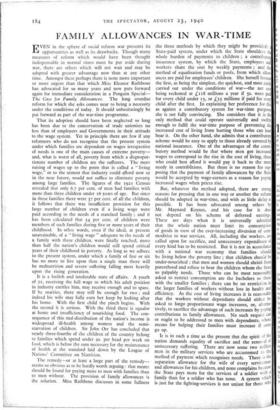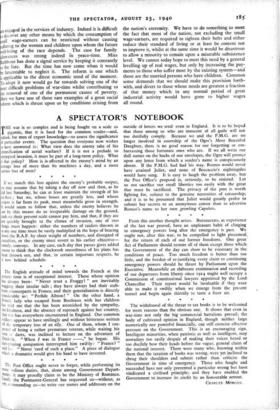FAMILY ALLOWANCES IN WAR-TIME
EVEN in the sphere of social reform war presents its opportunities as well as its drawbacks. Though many measures of reform which would have been thought indispensable in normal times must be put aside during war, there are others which will not wait and may be adopted with greater advantage now than at any other time. Amongst these perhaps there is none more important or more urgent than that which Miss Eleanor Rathbone has advocated for so many years and now puts forward again for immediate consideration in a Penguin Special— The Case for Family Allowances. The long overdue reform for which she asks comes near to being a necessity under the conditions of today. It should unhesitatingly be put forward as part of the war-time programme.
That its adoption should have been neglected so long has been due to the conservatism of trade unionists no less than of employers and Governments in their attitude to the wage system. Yet in principle there are few if any reformers who do not recognise that the present system under which families are dependent on wages irrespective of needs is one of the main causes of extreme poverty— and, what is worst of all, poverty from which a dispropor- tionate number of children are the sufferers. The mere raising of wages up to the point that is called a " living wage," or to the utmost that industry could afford now or in the near future, would not suffice to eliminate poverty among large families. The figures of the 1921 Census revealed that only 6.7 per cent. of men had families with more than three children under 16 years of age. But since in these families there were 37 per cent. of all the children, it follows that there was insufficient provision for this large number of children even if a living wage were paid according to the needs of a standard family ; and it has been calculated that 54 per cent. of children were members of such families during five or more years of their childhood. In other words, even if the ideal, at present unattainable, of a " living wage " adequate to the needs of a family with three children, were finally reached, more than half the nation's children would still spend critical years of their childhood in poverty. As long as we adhere to the present system, under which a family of five or six has no more to live upon than a single man there will be malnutrition and severe suffering falling most heavily upon the rising generation.
It is a foolish and intolerable state of affairs. A youth of 21, receiving the full wage to which his adult position in industry entitles him, may receive enough and to spare. If he marries, there may still be enough for two ; and indeed his wife may fully earn her keep by looking after his home. With the first child the pinch begins. With the second it is serious. With the third there is squalor at home and insufficiency of nourishing food. The con- sequence of this mal-distribution of the nation's income is widespread ill-health among women and the semi- starvation of children. Sir John Orr has concluded that nearly three-fourths of the children of the country belong to families which spend under gs. per head per week on food, which is below the sum necessary for the maintenance of health at the standard laid down by the League of Nations' Committee on Nutrition.
The remedy—or at least a large part of the remedy— seems so obvious as to be hardly worth arguing : that means should be found for paying more to men with families than to men without. The provision of family allowances is the solution. Miss Rathbone discusses in some fullness the three methods by which they might be provided: State-paid system, under which the State shoulders whole burden of payments to children ; a contributo insurance system, by which the State, employers and workers share the cost by weekly payments ; and the method of equalisation funds or pools, from which allow ances are paid for employees' children. She herself favo the first, as being the simplest, the quickest, and most eas carried out under the conditions of war—the net c being reckoned at £118 millions a year if 5s. were pal for every child under 15, or £55 millions if paid for eve child after the first. In explaining her preference for thi as against a contributory system for war-time purposes she is not fully convincing. She considers that it is th only method that could operate universally and swift! enough to fulfil the war-time purpose of preventing th increased cost of living from hurting those who can 1 bear it. On the other hand, she admits that a contributo scheme would be easy to apply to those already covered b national insurance. One of the advantages of the conm- butory method would be that where men got increased wages to correspond to the rise in the cost of living, those who could best afford it would pay it back to the more needy in contribttions. But there is no reason for sup- posing that the payment of family allowances by the State would be accepted by wage-earners as a reason for paying increased wages when prices rise.
But, whatever the method adopted, there are strong reasons for pressing that in one way or another the reform should be adopted in war-time, and with as little delay as possible. It has been advocated among others by Mr. Maynard Keynes, and his case for it does not depend on his scheme of deferred earnings. These are days when it is universally admitted that the whole nation must limit its consumption of goods in view of the ever-increasing diversion of com- modities to war services. All, including the workers, are called upon for sacrifice, and unnecessary expenditure of every kind has to be restricted. But it is not in accordance with a national war economy that families should be living below the poverty line ; that children should be under-nourished ; that men and women should shrink from parenthood and refuse to bear the children whom the State so palpably needs. Those who can be most reasonably asked to restrict consumption are the bachelors or those with the smaller families ; there can be no restriction in the larger families of workers without loss in health and efficiency. As the cost of living increases it is reasonable tr that the workers without dependants should either be asked to forgo proportionate wage increases, or, alterna- tively, to sacrifice the advantage of such increases by paying contributions to family allowances. No such request an or ought to be addressed to men with dependants, whose means for helping their families must increasen if costs It is in such a time as the present that the spirit of thego up. nation demands equality of sacrifice and the removal of unnecessary suffering. There are now some two million men in the military services who are accustomed to the method of payment which recognises needs. There is the separation allowance for the wife of every serviceman and allowances for his children, and none complains because the State pays more for the services of a soldier with family than for a soldier who has none. A system %d i° is just for the fighting-services is not unjust for those who e engaged in the services of industry. Indeed it is difficult a discover any other means by which the consumption of mall wage-earners can be restricted without causing offering to the women and children upon whom the future ,ell-being of the race depends. The case for family owances was strong indeed in peace-time. Miss thbone has done a signal service by keeping it constantly o the fore. But the time has now come when it would lamentable to neglect it. The reform is one which applicable to the direst economic need of the moment.
o adopt it now would go far towards solving one of the ost difficult problems of war-time whilst contributing to the removal of one of the permanent causes of poverty. Here we have one of those rare examples of a great social reform which is thrust upon us by conditions arising from the nation's extremity. We have to do something to meet the fact that most of the nation, not excluding the small wage-earners, are required to tighten their belts and either reduce their standard of living or at least be content not to improve it, whilst at the same time it would be disastrous to allow a minority to remain upon a miserable subsistence level. We cannot today hope to meet this need by a general levelling up of real wages, but only by increasing the pay- ments to those who suffer most by the existing system—and those are the married persons who have children. Common sense demands that we should make this provision forth- with, and divert to those whose needs are greatest a fraction of that money which in any normal period of great industrial activity would have gone to higher wages all round.































 Previous page
Previous page